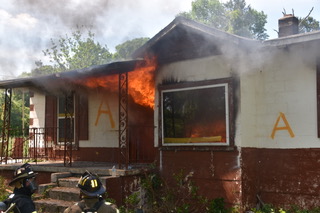By Warren Whitley
Over the course of my long career as a fire fighter, I like to think that I have grown in wisdom and knowledge. I acknowledge acting like I knew it all when I was a neophyte, but some good mentors showed me that was a stifling attitude. This brings me to an important thing to ponder – ontology and epistemology. The short explanation for these terms is this; ontology is what you know and epistemology is how you know it. Simple, right? If we took a deep dive into the mechanics and philosophies behind those two terms, we would have a very long paper, so we will use the simple version as it suits my purpose.
Since the science of fire behavior has been my primary interest for many years, I pay attention to who is doing what and I read articles with a critical eye. I can tell you that it is very evident that the US fire service does not have a peer review process and we desperately need one. And who would we use as peer reviewers? A problem that is not insurmountable, but requiring some thought and institutional support.
So, what? I wanted to point out that I have talked to, read articles by, and looked at social media posts, many by firefighters who espouse one particular point of view or advocate a particular tactic and eschew all others. They are, ‘one size fits all’ fire fighters and a lot of what they prescribe is only based on anecdotal evidence. An example are the folks my friend Andy Starnes calls combination nozzle Catholics and smooth bore Baptists; each convinced they have THE answer to fire extinguishment. This type of attitude is what we need to address. Being so wed to a particular way of doing things destroys the critical thinking process as well as maintaining a bias towards anything different. It also indicates an unwillingness to gain an understanding of the ‘why’ they are doing something. How do we address this shortcoming? By expanding our knowledge base and understanding how we acquire knowledge.
One way to acquire knowledge is through experiences. Take classes. Take the same class from different instructors. Take the time to analyze what they presented and determine the deltas between their shared knowledge. Why are there differences? Ask them to explain why one said A is true and B is not and explain why the other one said something different.
Read. Read a lot. Read a wide variety of subjects and authors. Read books and not just journals. If you find something really interesting, try using Google Scholar to find articles that are related for more information and a deeper understanding. Look outside of the US fire service. Look at the credentials of the authors. Is the article in a peer reviewed journal? This adds to credibility. Far too often I hear fire fighters tell me that they don’t like to read and the sad thing is, that will forever stunt their intellectual growth by limiting their sources of information. Their knowledge and experiences become reliant on ‘stories’ from the old hands and things they see on TV or the computer.
Go to school. College is not about a piece of paper, it is about the collection of knowledge and broadening the avenues of that collection process. This includes discourse with your fellow students and professors. If you disagree with what a professor is telling you, form a cogent argument based on rational thought, even if you don’t articulate it in class. Write it down, it could be useful for a paper later and you can always do a bit of research.
Be open minded. When my fire behavior journey started in earnest back in the late 90s, it was influenced by a one on one, white board and marker conversation with an English fellow who was able to demonstrate how my traditional thinking regarding fire behavior and the influence of air on the fire was on shaky ground. This was eventually followed by live fire demonstrations that solidified the ‘a-ha’ moment. If I had remained an obstinate and ethnocentric dude, convinced that the American way was the only way, then my knowledge base would not have expanded as it has since then and I would have had no exposure to tactics and tools that can make firefighting safer and more efficient.
My bottom line is for you, the reader, to try not to be the guy that only knows how to do one thing with one tactic and then wants to defend it ad nauseum, regardless of whether his track record of outcomes was positive or not. We cannot afford to do things because ‘we have always done it that way’ because that is complacency and complacency will eventually cause bad outcomes. If you truly want to be a ‘professional’, then you must be a master of your craft and that only comes through hard work, being open minded, and learning all you can.
Now, go search out Truth. Et invenies verum.
